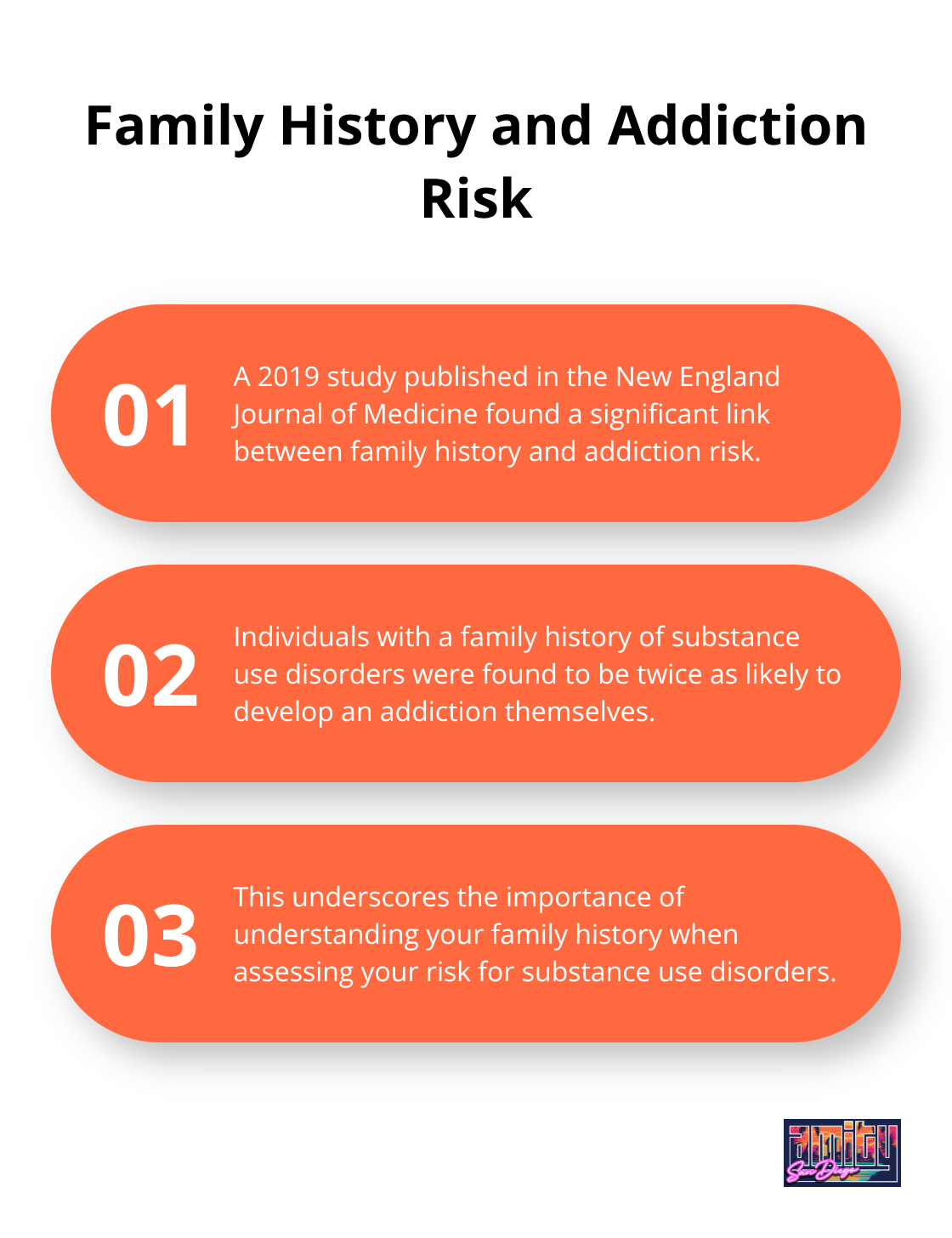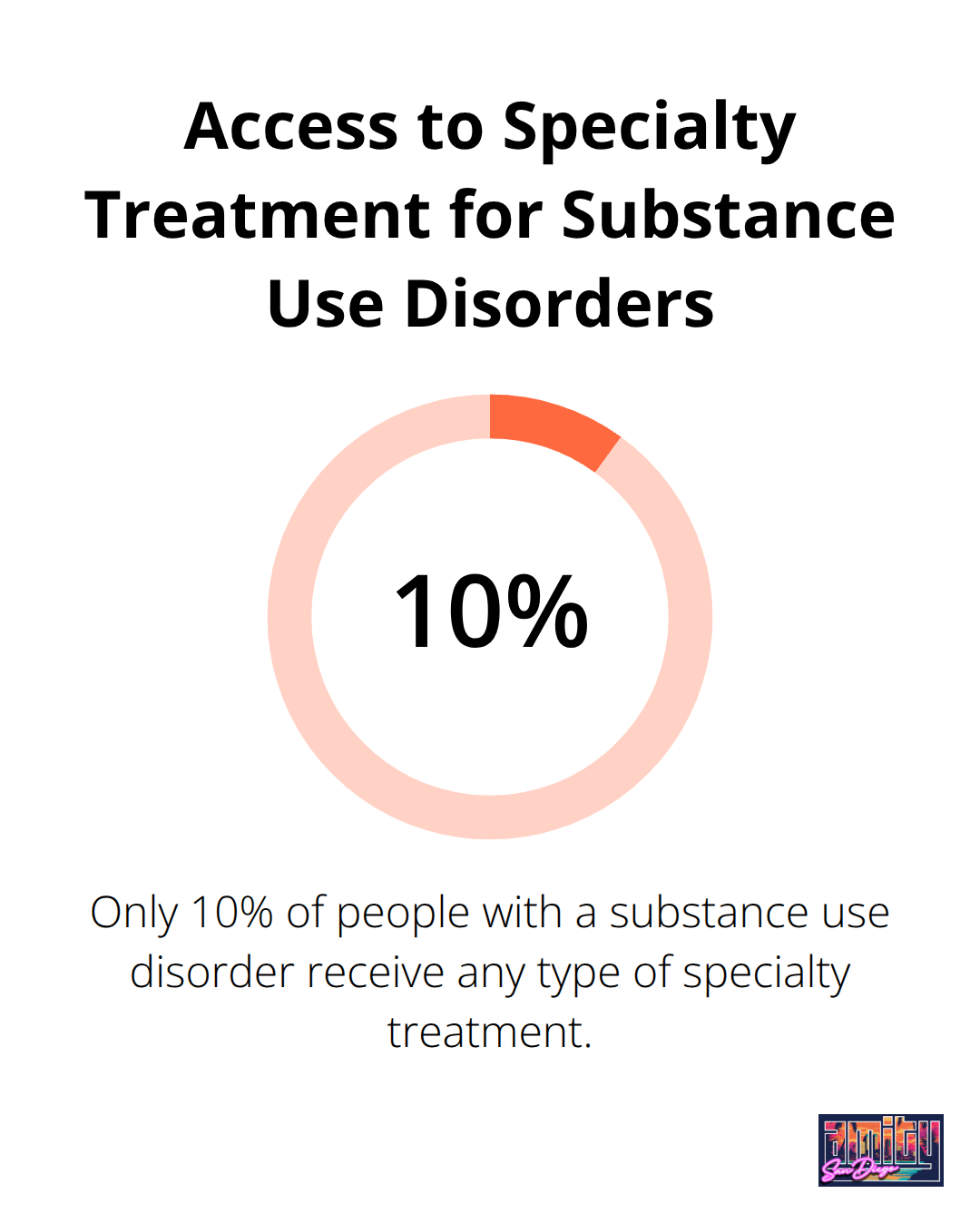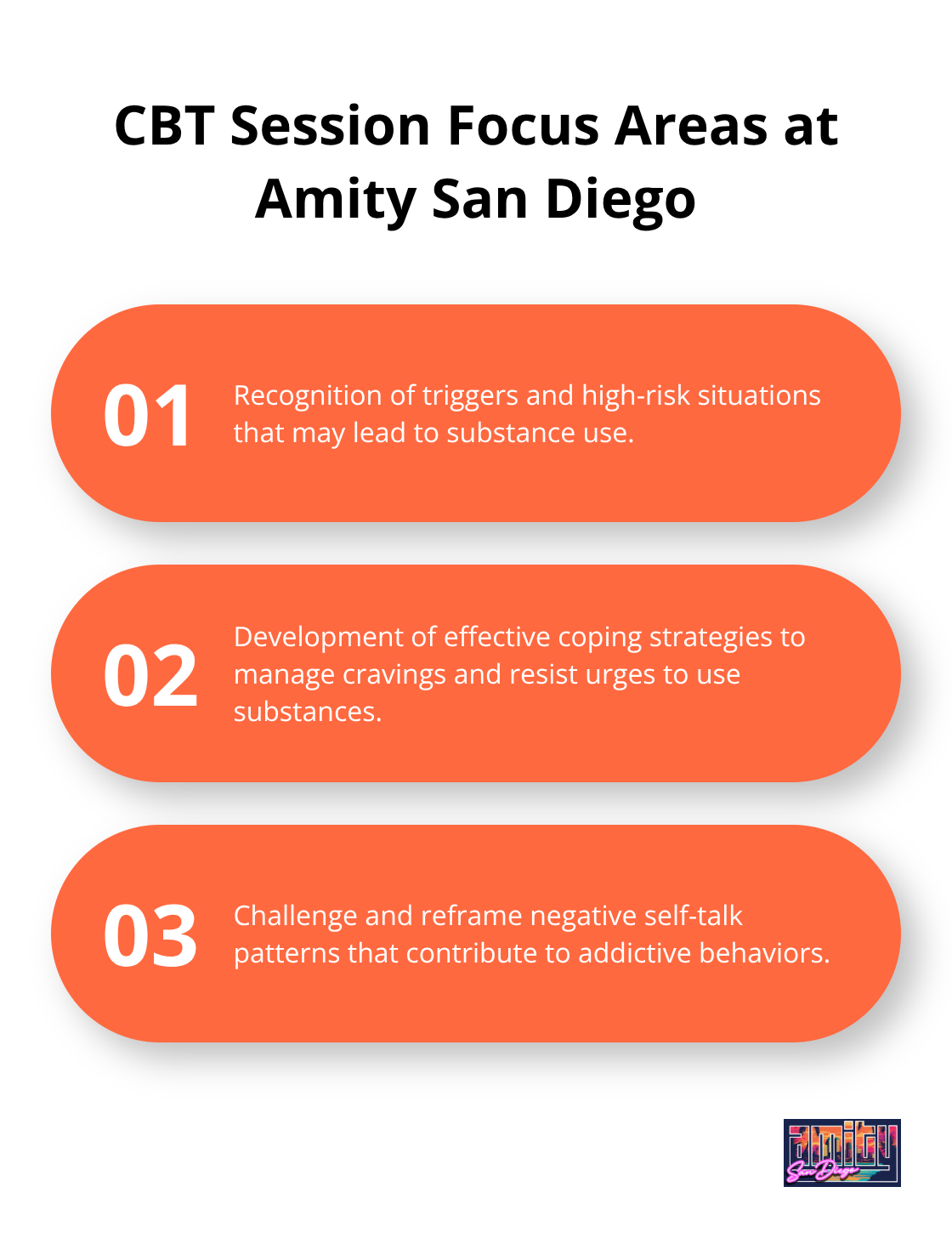At Amity San Diego, we know that understanding addiction recovery is crucial for those seeking help and their loved ones.
Addiction is a complex disease that affects millions of people worldwide, altering brain chemistry and behavior patterns.
In this post, we’ll explore the key concepts of addiction recovery, from the science behind substance use disorders to evidence-based treatment approaches.
By shedding light on these essential aspects, we aim to provide valuable insights for anyone navigating the path to recovery.
How Addiction Affects the Brain
The Brain’s Reward System Hijacked
At Amity San Diego, we understand that addiction isn’t just about willpower; it’s a chronic, treatable condition that affects the brain, body, and behavior – and it requires real, compassionate care. Substance use disorders fundamentally alter the brain’s reward system. When a person uses drugs or alcohol, their brain releases large amounts of dopamine (a neurotransmitter associated with pleasure and reward). Over time, the brain adapts to this dopamine flood by producing less of it naturally. This leads to a vicious cycle where the person needs more of the substance to feel “normal.”
The National Institute on Drug Abuse reports that this process can lead to changes in other brain circuits and systems, affecting functions like learning, judgment, decision-making, stress, memory, and behavior.
The Role of Genetics and Environment
While no single factor determines if a person will develop an addiction, genetics play a significant role. Recent studies have revealed shared genetic markers underlying substance use disorders, which also predict higher risk of mental and physical illness, including psychiatric conditions. However, environmental factors such as stress, trauma, and early exposure to substances also contribute significantly.
A 2019 study published in the New England Journal of Medicine found that individuals with a family history of substance use disorders were twice as likely to develop an addiction themselves. This underscores the importance of understanding your family history when assessing your risk.

Long-Term Effects on Brain Structure
Prolonged substance abuse can lead to lasting changes in brain structure and function. Imaging studies in drug abusers and non-drug abusers have shown that drugs of abuse increase the extracellular concentration of dopamine in the striatum, a part of the brain involved in reward processing.
The Importance of Professional Help
Given the complex nature of addiction and its effects on the brain, professional help often becomes necessary for successful recovery. A team of board-certified physicians and licensed therapists who understand the latest research in addiction science can make a significant difference in treatment outcomes.
Evidence-based treatments like Cognitive Behavioral Therapy (CBT) and Dialectical Behavior Therapy (DBT) help rewire harmful thought patterns and behaviors. For some clients, Medication-Assisted Treatment (MAT) may be appropriate to help manage cravings and withdrawal symptoms while the brain heals.
Addiction is a chronic disease, not a moral failing. With the right support and treatment, recovery becomes possible. The path to recovery starts with understanding, and professional guidance can be invaluable every step of the way.
As we move forward, let’s explore the various stages of addiction recovery and how they contribute to long-term healing and sobriety.
The Recovery Journey: From Recognition to Resilience
Acknowledging the Need for Change
At Amity San Diego, we’ve guided numerous individuals through their recovery journeys. Recovery isn’t a single event, but a process that unfolds over time. The first step in any recovery journey involves acknowledging the existence of a problem. This step often proves challenging. The National Survey on Drug Use and Health reports that only about 10% of people with a substance use disorder receive any type of specialty treatment. Many individuals require a significant event – sometimes called a “rock bottom” moment – to prompt this realization.

We encourage individuals to seek help before reaching this critical point. Early intervention can prevent severe health consequences and simplify the recovery process. If you question your relationship with substances, a professional assessment can provide valuable insights.
Detox and Withdrawal: A Critical Phase
Once an individual decides to seek help, detoxification often follows. This process can challenge both physical and emotional resilience. The severity of withdrawal symptoms varies based on the substance used, duration of use, and individual health factors.
Alcohol withdrawal, for example, can threaten life in severe cases, potentially causing seizures or delirium tremens. Opioid withdrawal, while rarely life-threatening, can cause extreme discomfort. These risks underscore the importance of medically supervised detox for safety and comfort.
Building a Strong Foundation in Early Recovery
The initial days of sobriety hold critical importance. During this period, individuals learn to navigate daily life without substances, often for the first time in years. This stage brings significant change and can stir emotional turbulence.
We focus on helping our clients develop healthy coping strategies during this stage. These strategies may include mindfulness techniques, stress management skills, and trigger identification. We also address any co-occurring mental health issues, as these often play a significant role in substance use.
A study published in the Journal of Substance Abuse Treatment found that individuals who participated in intensive outpatient programs (IOP) in early recovery had significantly better outcomes than those who didn’t. Intensive outpatient programs provide the structure and support needed during this crucial time.
Maintaining Long-Term Recovery
Maintaining recovery requires ongoing effort. The risk of relapse peaks in the first year of sobriety but can occur at any time. This reality emphasizes the importance of ongoing support and relapse prevention strategies.
One effective tool we use is the Relapse Prevention Model developed by Marlatt and Gordon. This approach helps individuals identify high-risk situations and develop coping strategies to manage them effectively.
We also encourage our clients to engage in ongoing therapy, support groups, and alumni programs. These resources provide continued support and accountability, which prove crucial for long-term success.
As we transition to our next section, we’ll explore the evidence-based treatment approaches that form the backbone of effective addiction recovery programs. These scientifically-proven methods (including Cognitive Behavioral Therapy and Medication-Assisted Treatment) play a vital role in helping individuals achieve and maintain sobriety.
Proven Approaches for Lasting Recovery
The Power of Cognitive Behavioral Therapy
At Amity San Diego, we rely on evidence-based treatments that consistently help individuals overcome addiction. Cognitive Behavioral Therapy (CBT) stands out as one of the most effective tools in addiction treatment. This therapy helps individuals identify and change negative thought patterns and behaviors associated with substance use. Research indicates that CBT can be effective in reducing the likelihood of relapse among drug users, although brief interventions (BI) were found to be more effective than CBT for relapse prevention in some cases.
CBT sessions at Amity San Diego focus on developing specific skills:
- Recognition of triggers and high-risk situations
- Development of coping strategies to manage cravings
- Challenge and reframe negative self-talk
- Improvement of problem-solving skills

These skills empower our clients to navigate challenges in recovery and build resilience against relapse.
Medication-Assisted Treatment: A Game-Changer
Medication-Assisted Treatment (MAT) combines behavioral therapy with FDA-approved medications to address substance use disorders. The Substance Abuse and Mental Health Services Administration (SAMHSA) reports that MAT significantly improves patient survival rates, increases retention in treatment, and decreases illicit opiate use.
We offer MAT options including:
- Buprenorphine for opioid addiction
- Naltrexone for alcohol and opioid dependence
- Acamprosate for alcohol use disorder
Our medical team carefully assesses each client to determine if MAT is appropriate and monitors progress throughout treatment.
The Healing Power of Community
Group therapy and support networks play a vital role in recovery. The National Institute on Drug Abuse emphasizes that group therapy provides social reinforcement for abstinence and other positive behavioral changes.
We structure our group sessions to foster:
- Peer support and accountability
- Skill-building through shared experiences
- Reduction of feelings of isolation
- Practice in interpersonal communication
Many of our clients find that the connections formed in group therapy become an essential part of their long-term recovery support system.
Integrating Holistic Approaches
While evidence-based therapies form the core of our treatment, we also incorporate holistic and complementary therapies to address the whole person. These may include:
- Mindfulness meditation
- Yoga and physical exercise
- Nutritional counseling
- Art and music therapy
Research has shown that mindfulness training can improve quality of life and reduce craving and relapse rates in opioid-dependent individuals.
We combine these proven approaches to create a comprehensive treatment plan tailored to each individual’s needs (this integrated strategy gives our clients the best possible chance at achieving lasting recovery and reclaiming their lives from addiction).
Final Thoughts
Understanding addiction recovery requires compassion, dedication, and evidence-based approaches. Addiction alters brain chemistry and behavior, necessitating professional intervention. At Amity San Diego, we recognize the complexity of this disease and its impact on overall well-being.
Recovery progresses through stages, each presenting unique challenges and opportunities for growth. Detoxification and early abstinence establish a foundation for healing, while ongoing support and relapse prevention strategies sustain long-term sobriety. Evidence-based treatments, such as Cognitive Behavioral Therapy and Medication-Assisted Treatment, form the core of effective addiction care.
Personalized treatment plans address each individual’s unique needs. Our team of board-certified physicians and licensed therapists create a supportive environment where healing flourishes. For those seeking addiction treatment in San Diego, professional help can guide you towards a fulfilling life in recovery.

